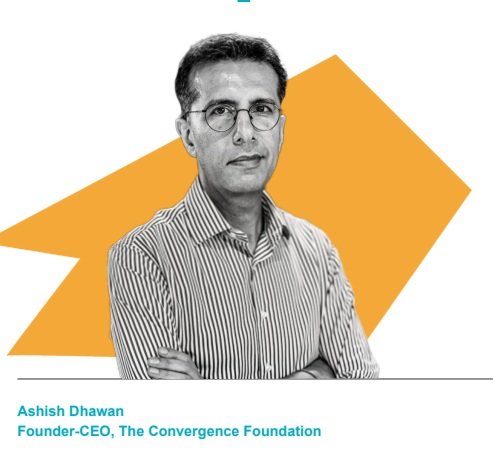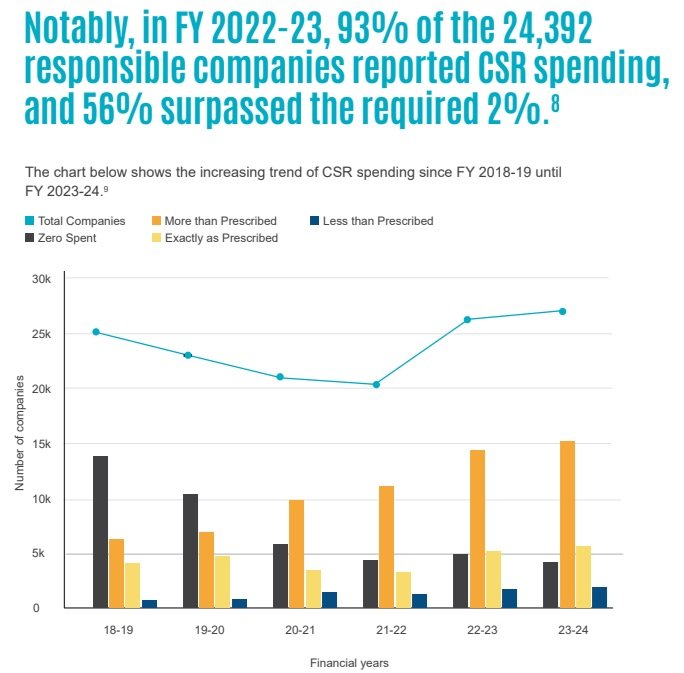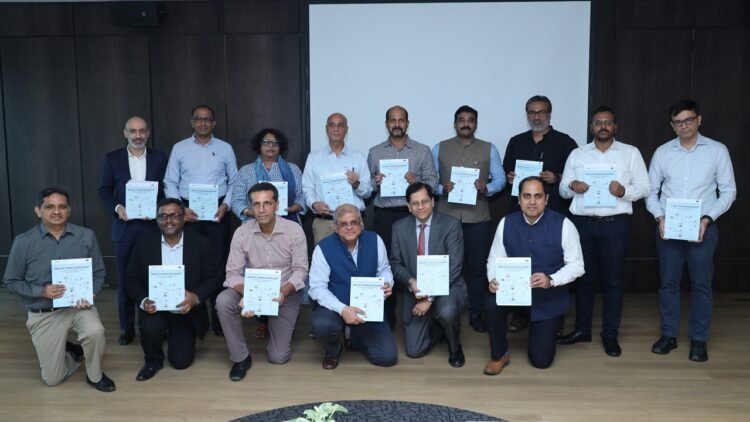New report shows the emergence of a new ethos in Indian CSR – collaborative, bold, and systemic – to create a multiplier effect in development outcomes
MUMBAI (India CSR): A decade after Corporate Social Responsibility (CSR) became mandatory under Indian law, a new report has underlined its evolution from compliance to a strategic lever for addressing large-scale development challenges. The study projects that annual CSR spending in India could treble to over Rs. 1.2 lakh crore by 2035, positioning it as the country’s largest pool of philanthropic capital. The report highlighted a shift towards systemic, collaborative philanthropy in India.
The report, India Inc. for Building Bharat: How Systemic CSR is Building Enduring Impact for Tomorrow, was launched Thursday by The Convergence Foundation (TCF) and its network organisation SCALE, with India Impact Sherpas as knowledge partner. The event, held at The Quorum in Mumbai, saw participation from over 50 corporate and CSR leaders.
Emerging Trends in Systemic CSR
The report highlights that Indian corporations are increasingly adopting systemic giving models, directing catalytic funding to organisations that partner with governments to strengthen public systems. It documents 13 leading CSR initiatives and foundations which have shifted towards designing scalable proof-points, building ecosystems, and creating public goods and technology platforms.
In FY24, CSR spending was pegged at around Rs. 30,000 crore, compared to the government’s annual social sector outlay of Rs. 25.7 lakh crore — nearly 8% of GDP.
The authors argue that with CSR funds expected to grow sharply over the next decade, the private sector has an opportunity to complement state spending by supporting innovation and systemic solutions.
Call for Bold Leadership

Unveiling the report, TCF Founder and CEO Ashish Dhawan said CEOs must treat CSR as long-term investment capital.
“CEOs can set a bold vision by treating CSR as a long-term investment that creates non-linear social returns. To create large-scale impact, hiring a strong CSR leader with a genuine commitment to social impact is one of the most important decisions a business leader can make,” Dhawan said.
He added that companies should apply a portfolio lens to their CSR allocations, combining direct programmes with systemic initiatives that address root causes. “As CSR resources grow, companies can aspire to allocate 10-20% of their portfolio towards long-term bets on systemic change,” he noted.
Examples of Systemic Impact
The report cites several examples where business promoters played a direct role in shaping systemic interventions. Cipla Foundation, guided by its promoters, has worked to improve India’s palliative care ecosystem. Bajaj Finserv’s “Skillserv” skilling programme, implemented in 400 colleges across 23 states, was closely steered by its leadership.
It also notes advances in measurement frameworks. Reliance Foundation employs a Climate Resilience Index to track rural transformation outcomes, reaching 21.3 million people. Cisco Foundation applies systems-strengthening tools to evaluate both direct and indirect impacts of its programmes.
Further, the study underlines the importance of partnerships. HUL’s Project Circular Bharat works with governments, recyclers, startups, and knowledge partners, while HSBC’s “Skills for Life” initiative helped shape India’s first Skill Impact Bond in collaboration with NSDC.

Second Innings of CSR
“CSR has matured significantly over the last few years, particularly since becoming a legal mandate in 2013. In its second innings over the next decade, there is an opportunity to use CSR as a strategic investment and act as a vehicle for transformative change,” said Govind Iyer, Chair of Infosys’ CSR Committee and TCF advisory board member.
He added that the journeys of the 13 profiled foundations offer a precedent and practical roadmap for systemic giving that can be replicated across India Inc.
Here’s a clear table of key facts from the report for quick reference:
| Key Fact | Detail |
|---|---|
| Current CSR Spend (FY24) | ₹30,000 crore |
| Projected CSR Spend by 2035 | Over ₹1.2 lakh crore annually |
| Govt. Social Sector Outlay (FY24) | ₹25.7 lakh crore (≈8% of GDP) |
| No. of CSRs/Foundations Profiled | 13 systemic CSR models |
| Focus Areas | Public systems strengthening, ecosystem building, technology platforms, proof-points for scale |
| Examples of Systemic CSR | Cipla Foundation (palliative care), Bajaj Finserv “Skillserv” (skilling), Reliance Foundation (climate index), Cisco (systems strengthening), HUL (Circular Bharat), HSBC (Skill Impact Bond) |
| Strategic CSR Recommendation | CEOs to treat CSR as long-term investment; allocate 10–20% for systemic initiatives |
| Report Published By | The Convergence Foundation (with SCALE & India Impact Sherpas) |
| Date of Launch | September 25, 2025 |
The report highlighted a few critical enablers for systemic CSR:
1. Promoters/business champions personally engaged in shaping philanthropic decision-making
- Cipla promoters shaped Cipla Foundation’s focus on improving the palliative care ecosystem and shaping sector-wide standards of care.
- Bajaj Finserv’s “Skillserv” program – a skilling initiative in the financial sector – was closely shaped by the promoters, and is currently implemented in 400 colleges across 23 states.
2. Robust measurement mechanisms to track the effectiveness and systemic impact of CSR Programs
- Reliance Foundation uses a comprehensive Climate Resilience Index to measure the impact of its Rural Transformation programmes, which has cumulatively reached 21.3 million people over years, on awareness and adoption, strong community networks, and ecosystem restoration.
- Cisco Foundation’s systems strengthening framework measures direct and indirect impact of their programs, ,especially for its multi-funder initiative – the Future Right Skills Network.
3. Partnerships with governments and other funders to scale CSR initiatives & amplify impact
- HUL’s Project Circular Bharat has a range of partnerships with governments, community organisations, recyclers, startups, and knowledge experts.
- HSBC’s experience with the collaborative model of the Skills for Life programme became a replicable model which informed India’s first Skill Impact Bond with NSDC, for which HSBC also became one of the outcome funders.
(India CSR)







